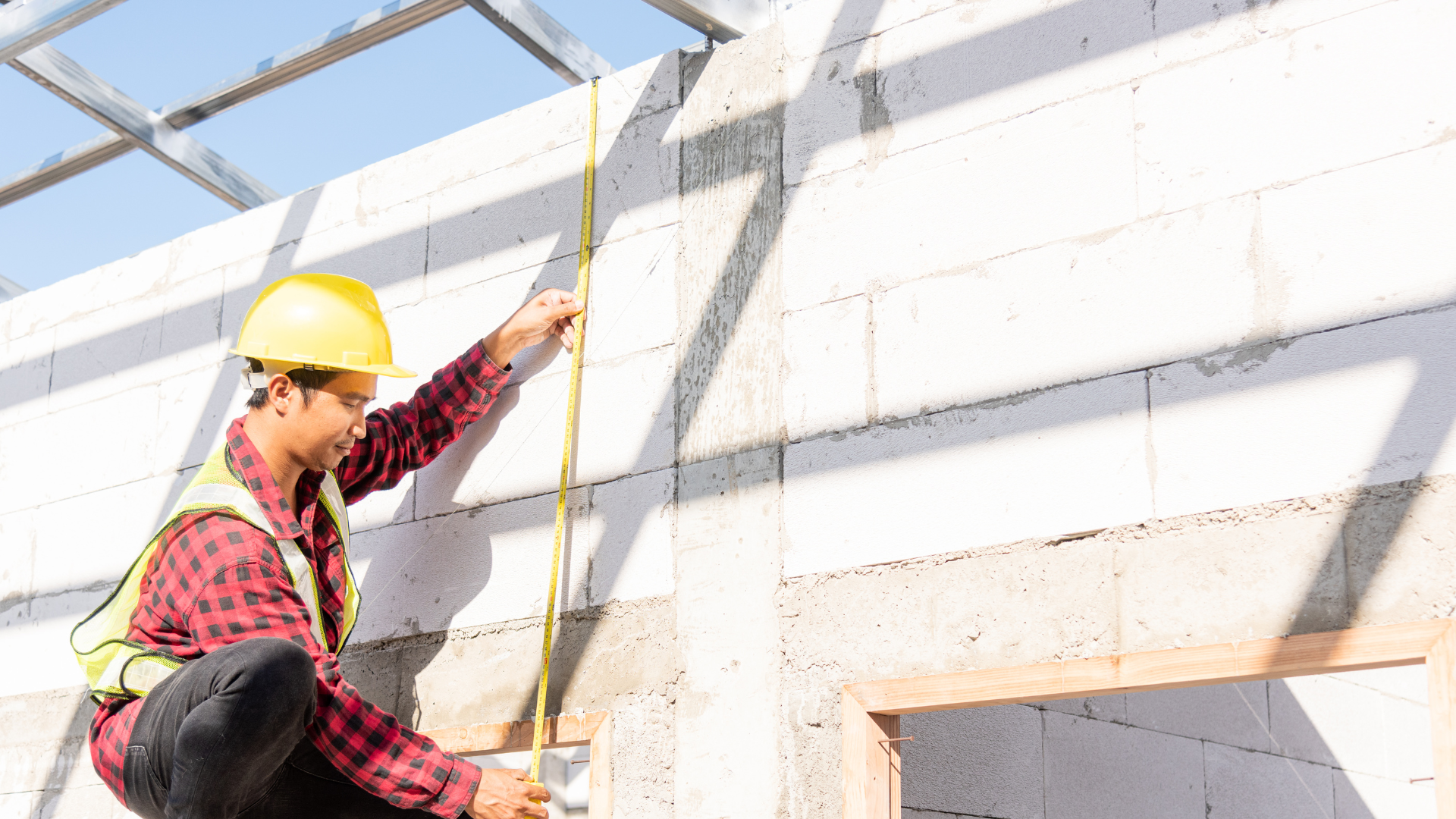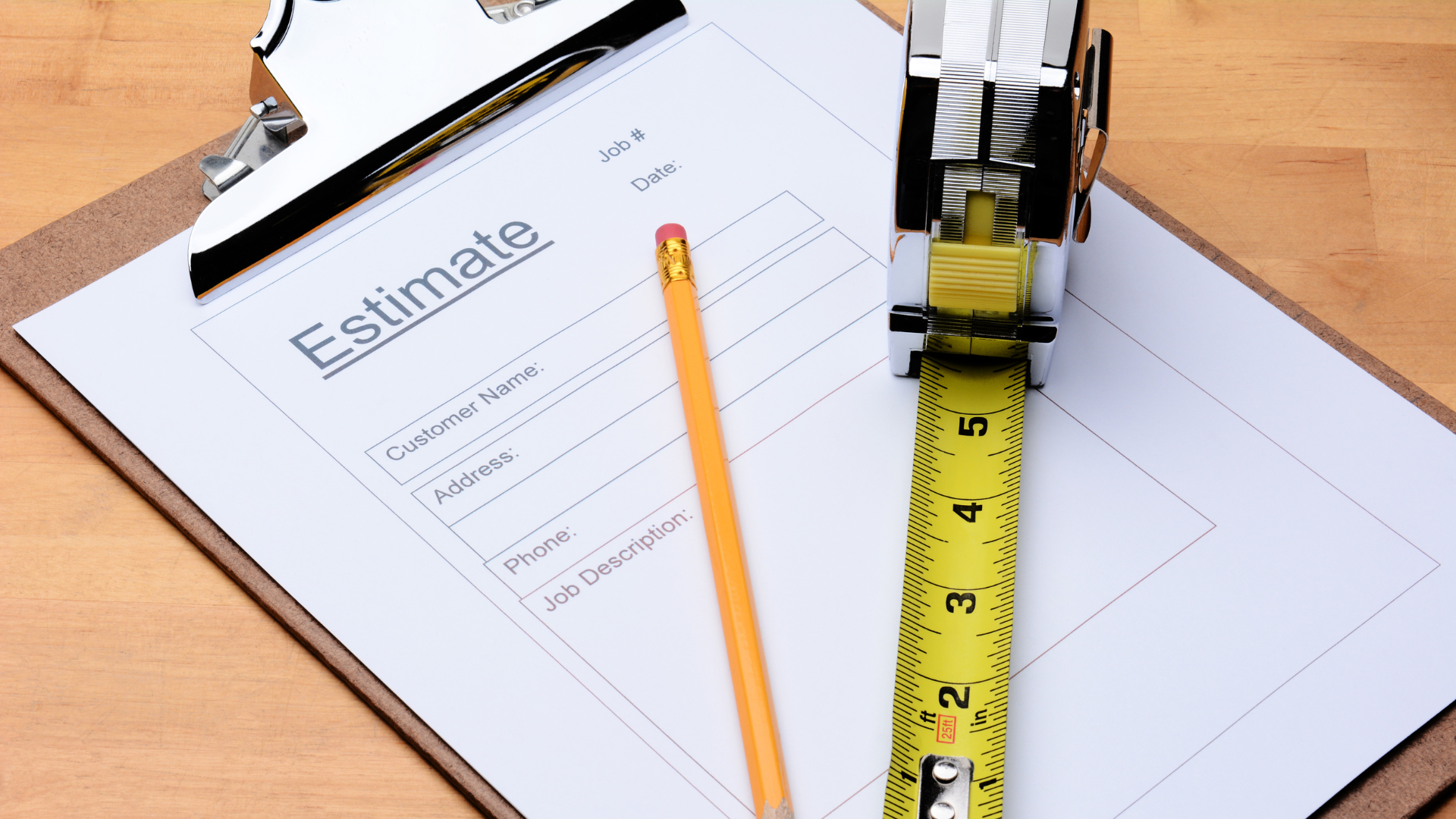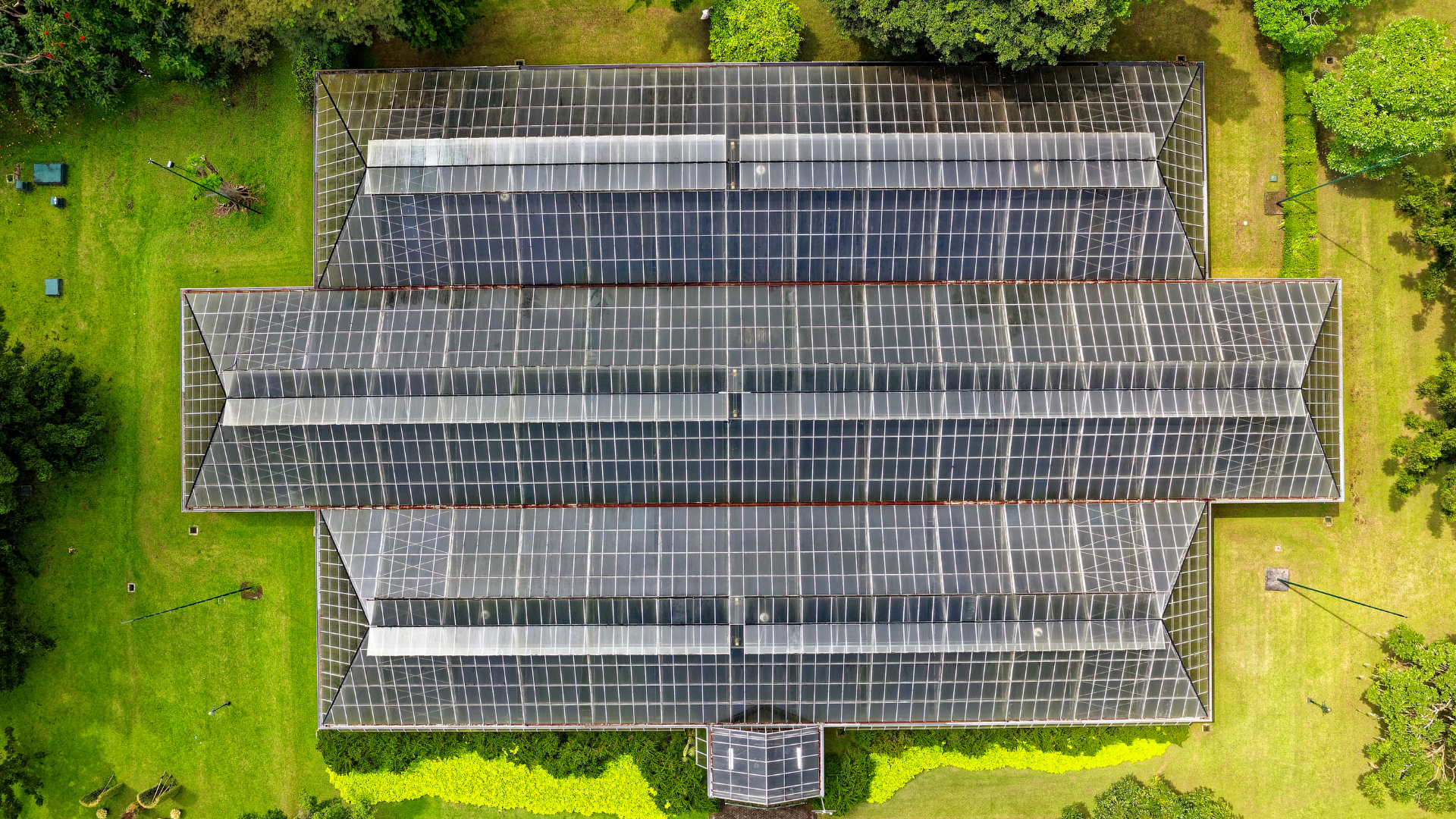September 22, 2025
Running a roofing business isn’t just about storing contacts; it’s about juggling estimates, job photos, insurance paperwork, and crews on the move. A generic CRM might keep things basic, but roofers need more.
That’s where a roofing CRM comes into the picture.
It gives contractors the right tools to stay organized, save time, and close more jobs without the stress of spreadsheets and sticky notes.
Choosing the right CRM isn’t just about software, but it's also about building a reliable, organized, and profitable roofing business where teams stay connected, customers feel valued, and projects move forward seamlessly.
Roofing CRM vs Generic CRM: What Contractors Really Need
If you run a roofing business, you already know that managing jobs, customers, crews, and paperwork can feel like juggling while standing on a moving ladder.
Every detail matters: a missed lead can mean lost revenue, a scheduling slip-up can frustrate customers, and disorganized photos can create disputes that cost you money.
That’s why your choice of CRM isn’t just another software decision; it’s a foundation for how smoothly your entire business runs.
A lot of roofing contractors start with a generic CRM because it promises to “manage contacts and deals.” But roofing isn’t like selling software or running an online shop.
The roofing industry presents unique challenges that require roofing software tailored to the job: fast-moving storm leads, on-site estimates, complex material orders, insurance paperwork, and field-heavy workflows.
That’s where roofing CRM platforms step in.
So let’s break down why a roofing CRM beats a generic one, what features really matter, and how the right platform can help your roofing team close more jobs while saving time.
Key Takeaways
- Generic CRMs manage contacts, but roofing CRMs manage entire jobs from inspections and photos to proposals and production.
- Roofing CRMs save time with tools built for the field, including aerial measurements, crew scheduling, and mobile apps that work offline.
- Insurance, financing, and storm leads are unique to roofing, and a roofing CRM handles them in ways generic tools simply can’t.
- The right roofing CRM enhances close rates and minimizes disputes, converting faster estimates and organized job data into tangible revenue.
- Contractors looking to grow beyond basics need a roofing CRM, while tiny teams may manage with generic CRMs until they scale.
The Roofing Business Reality in 2025
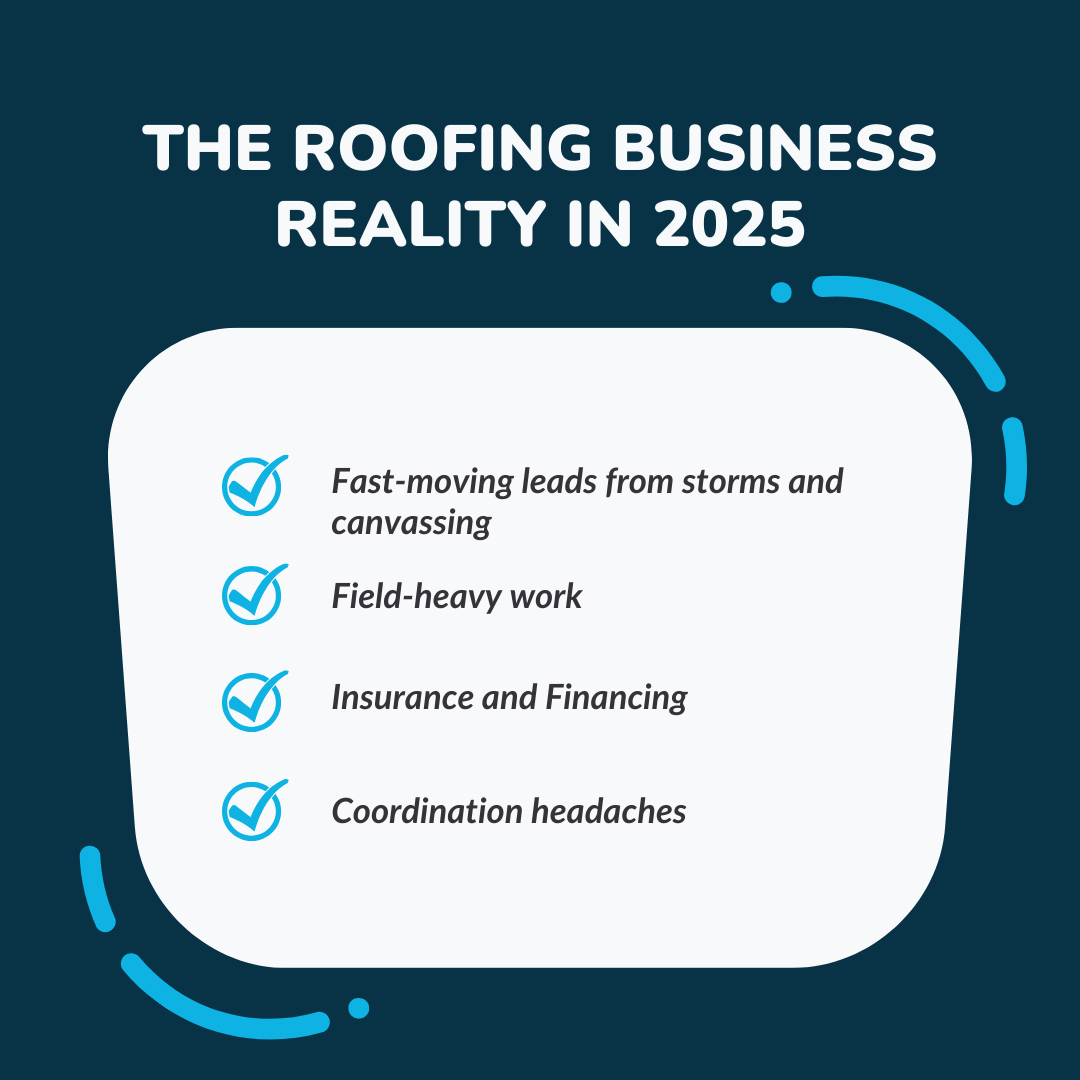
Roofing contractors in 2025 face a different kind of hustle than they did even a few years ago. Demand remains strong, but customer expectations are higher, and the competition is fierce.
- Fast-moving leads from storms and canvassing: After a hailstorm, homeowners expect a roofing company to knock on their door the same day, provide professional estimates, and move quickly. If you’re slow, another contractor will close the deal.
- Field-heavy work: Roofing jobs don’t happen on a desk. Crews, inspectors, and sales reps are constantly on the move, taking job photos, ordering materials, meeting customers, and sending updates.
- Insurance and Financing: Roofing projects often involve detailed insurance paperwork, financing approvals, and ongoing communication with adjusters. Missing a single form can delay payment processing or cash flow.
- Coordination headaches: Large roofing companies and even small teams need to manage multiple locations, suppliers, and subcontractors. Without the right tools, communication falls apart fast.
The truth is, sticky notes and spreadsheets won’t cut it anymore. Contractors require roofing CRM platforms that manage the entire workflow, from capturing new leads to tracking job stages and invoicing.
Still unsure how much your roofing business could benefit from a roofing CRM software? Take a look at this to find out more! How Roofing Proposal Software Helps You Close More Deals
What a Roofing CRM Is and How It Differs from a Generic CRM
When you’re running a roofing business, using the right tools makes all the difference. While a generic CRM can help manage contacts and sales, a roofing CRM goes much further. It’s built for the unique needs of contractors, crews, and projects.
What is a Roofing CRM?
A roofing CRM is designed specifically for contractors, not just sales teams. Instead of being limited to storing customer names and phone numbers, it brings everything you need to run a roofing business into one platform.
Think of it as a digital command center where sales, field crews, and office staff all work together seamlessly.
With a roofing CRM, you can do more than track leads. You can generate
- Professional estimates,
- Pull in aerial measurements,
- Collect e-signatures,
- Process payments, and
- Schedule jobs all from the same system.
No more juggling multiple apps or spreadsheets.
What is a Generic CRM?
A generic CRM, on the other hand, is designed for industries with straightforward sales cycles, such as software companies, consultants, or online service providers. They primarily focus on sales tasks, including organizing contacts, setting reminders, logging calls, and creating reports. For those industries, that’s enough.
But when it comes to roofing, generic CRMs quickly fall short. They don’t include roofing-ready workflows, such as measurement integrations, supplier ordering, or job site photo management.
That means contractors end up wasting time with double data entry, switching between apps, and using manual processes that slow down projects. The result? Missed opportunities, frustrated teams, and less time spent actually winning jobs.
Key Features You’ll Find Only in a Roofing CRM
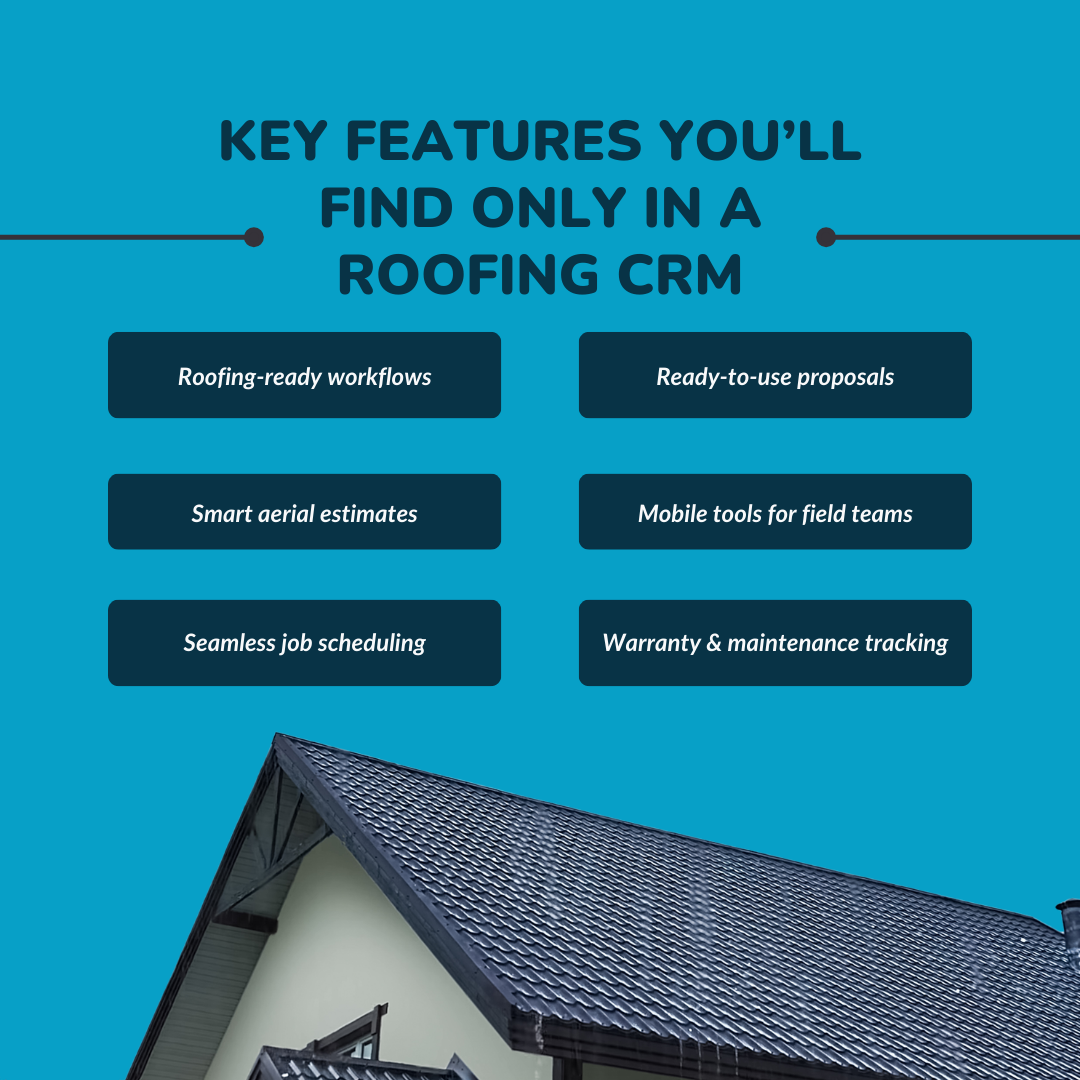
> Roofing-ready workflows
Roofing-ready workflows keep your projects organized from start to finish. They consolidate everything into one system, making job management feel smoother and less stressful.
- With drag-and-drop job stages, you can easily move projects forward without getting lost in messy spreadsheets or endless notes.
- The system enables you to view the entire journey of a job, from the initial lead to the final invoice, ensuring that nothing falls through the cracks.
- By linking customer details, estimates, and schedules in one place, you eliminate duplicate entry and save hours of administrative work.
> Smart aerial estimates
Smart aerial estimates eliminate the guesswork from roofing projects. With accurate measurements and built-in logic, you can create faster, safer, and more reliable forecasts without extra effort.
- Create fast and accurate estimates using aerial measurements that adhere to industry standards, ensuring your bids always appear professional.
- Skip the ladder and save hours by pulling exact roof dimensions directly from the software without ever stepping on the roof.
- Reduce costly errors with built-in material logic that automatically calculates the exact quantities needed for each project.
> Seamless job scheduling
Managing crews and timelines doesn’t have to be complicated. A roofing CRM gives you scheduling tools that make assigning and tracking jobs quick and stress-free.
- Assign crews with simple drag-and-drop scheduling, making it easy to place the right team on the right job without confusion.
- Route jobs across multiple locations so teams know exactly where to be and when, avoiding delays and mix-ups.
- Keep everyone updated with real-time text messages and push notifications, ensuring clear communication between office staff and field crews.
> Ready-to-use proposals
Winning jobs often comes down to how fast and professional your proposal looks. A roofing CRM makes it simple to send polished estimates that customers can approve on the spot.
- Generate professional estimates in just minutes, helping you respond quickly to new leads and stand out from competitors.
- Include e-signatures so customers can review and approve jobs instantly without waiting for paperwork.
- Customize proposals with your logo, chosen materials, and payment terms, making every document look branded and trustworthy.
> Mobile tools for field teams
Roofing work happens on-site, not behind a desk. A roofing CRM gives your crews the mobile tools they need to stay productive and connected in the field.
- Crews can snap job photos on-site and upload them directly from the app, keeping records clear and organized.
- With offline support, teams can keep working even without internet access and sync everything once they’re back online.
- Supervisors receive live updates on progress, allowing them to track work in real-time and intervene if necessary.
> Warranty & maintenance tracking
A roofing CRM doesn’t just help with sales and installs; it also keeps you connected to customers long after the project is done. By tracking warranties and scheduling regular maintenance, you build trust and foster stronger, long-term relationships.
- Maintain a detailed record of warranty claims in the system, allowing you to retrieve past work and address issues with ease.
- Schedule follow-up maintenance jobs right from the CRM, making it simple to plan service visits without losing track.
- Stay in touch with customers after installation to improve retention and convert one-time jobs into repeat business.
- Track commission payouts inside the CRM.
- Use analytics dashboards to monitor performance tracking for reps.
- Identify qualified leads and determine which sales tactics are most effective in optimizing sales.
Feature Showdown: Roofing CRM vs Generic CRM
| Feature | Roofing CRM | Generic CRM |
|---|---|---|
| Proposal & Estimate Automation | Templates + material logic | Manual or via add-ons |
| Job Scheduling & Routing | Roofing-optimized | Basic calendar only |
| Field App with Offline Support | Yes (photo, signature included) | Rare or not optimized |
| Warranty/Maintenance Module | Built-in | Not available |
| Commission & Storm Lead Support | Integrated | None |
When a Generic CRM Might Be Enough
There are situations where basic CRMs suffice. If you’re a small roofing business just starting with only a few leads, you might only need simple contact and task management. A lightweight CRM can help you stay organized early on.
But once you start scaling, adding crews, taking on more projects, or expanding into multiple locations, you’ll quickly encounter obstacles.
Generic CRMs don’t offer the roofing-specific workflows or integrations needed to compete with the top roofing companies in your area.
Having trouble selecting the best fit for your business? Here's your guide to choosing the best Roofing CRM for your roofing business. Best Roofing CRM Software for Contractors in 2025
The ROI: How a Roofing CRM Pays for Itself
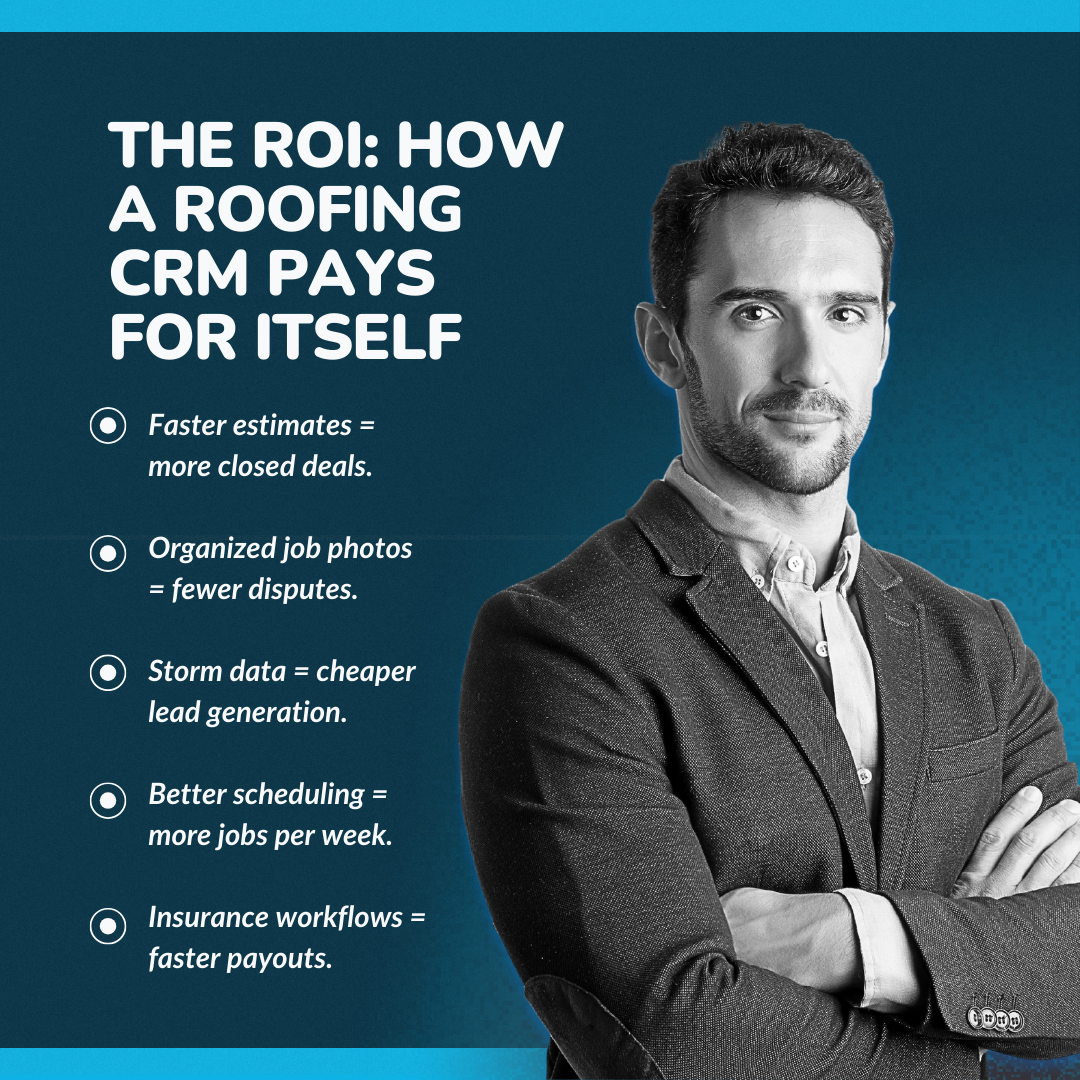
At first glance, a roofing CRM may feel like just another expense, but in reality, it’s one of the smartest investments you can make. The efficiency, time savings, and extra revenue it creates quickly cover the cost of the software.
- Faster estimates = more closed deals: When you deliver professional estimates on the spot instead of making homeowners wait days for a spreadsheet, you win trust and close more jobs.
- Organized job photos = fewer disputes: Storing all job site photos in one system makes it easy to share proof of work, reducing customer disagreements and protecting your business.
- Storm data = cheaper lead generation: Many roofing CRMs include storm-tracking integrations, helping you reach homeowners right after a storm hits when demand is highest and competition is lowest.
- Better scheduling = more jobs per week. With drag-and-drop calendars, you can assign crews in seconds, avoid overlaps, and fit in more jobs without adding extra stress.
- Insurance workflows = faster payouts. Built-in financing tools and insurance modules streamline claim approvals and payments.
Over time, the savings from fewer missed opportunities, faster billing processes, and more innovative project management easily outweigh the cost of the software.
Choosing the Right CRM: A Buyer’s Checklist
When comparing roofing CRM platforms, here’s what to look for:
1. Roofing-Specific Workflows
A roofing CRM should come with ready-to-use job stages, estimates, and project tools designed for roofers, not just generic sales pipelines.
2. Integrated Invoicing & Payments
Choose a CRM that supports automated invoicing, payment processing, and accounting integrations (like QuickBooks or Xero) to streamline cash flow.
3. Mobile-Optimized Field Access
Since most roofing work is done in the field, having an app that runs smoothly on mobile devices (with solid reviews in the app stores) is a must.
4. Seamless Integrations
The best platforms connect with aerial measurement tools, accounting software, and payment processors, so you avoid switching between apps all day.
5. Fast Onboarding & Easy UI
Your team shouldn’t spend weeks figuring out how to use the system. A simple interface gets everyone on board quickly.
6. Data Security & Ownership
Encrypted data storage, role-based access permissions, automated backups, and export options so your business always controls its data.
7. Real-Time Communication Tools
In-app messaging, automated email/SMS updates, and activity logs that keep sales teams, crews, and clients aligned from estimate to job completion.
8. Reporting & Analytics
Custom dashboards and real-time KPI tracking for sales performance, project profitability, lead conversion, and crew productivity.
9. Proposal & Estimation Tools
Ensure the CRM allows technicians to generate professional estimates using digital templates, aerial measurements, and instant pricing calculators.
The best roofing CRM is one that helps your business work smarter, not harder. It should feel like an all-in-one platform that reduces double entry, eliminates sticky notes, and increases efficiency across your company.
$76.4 billion - The U.S. roofing contractors industry is projected to reach this amount in 2025, reflecting a 0.8% increase from the previous year
How RooferBase CRM Transforms Your Roofing Business
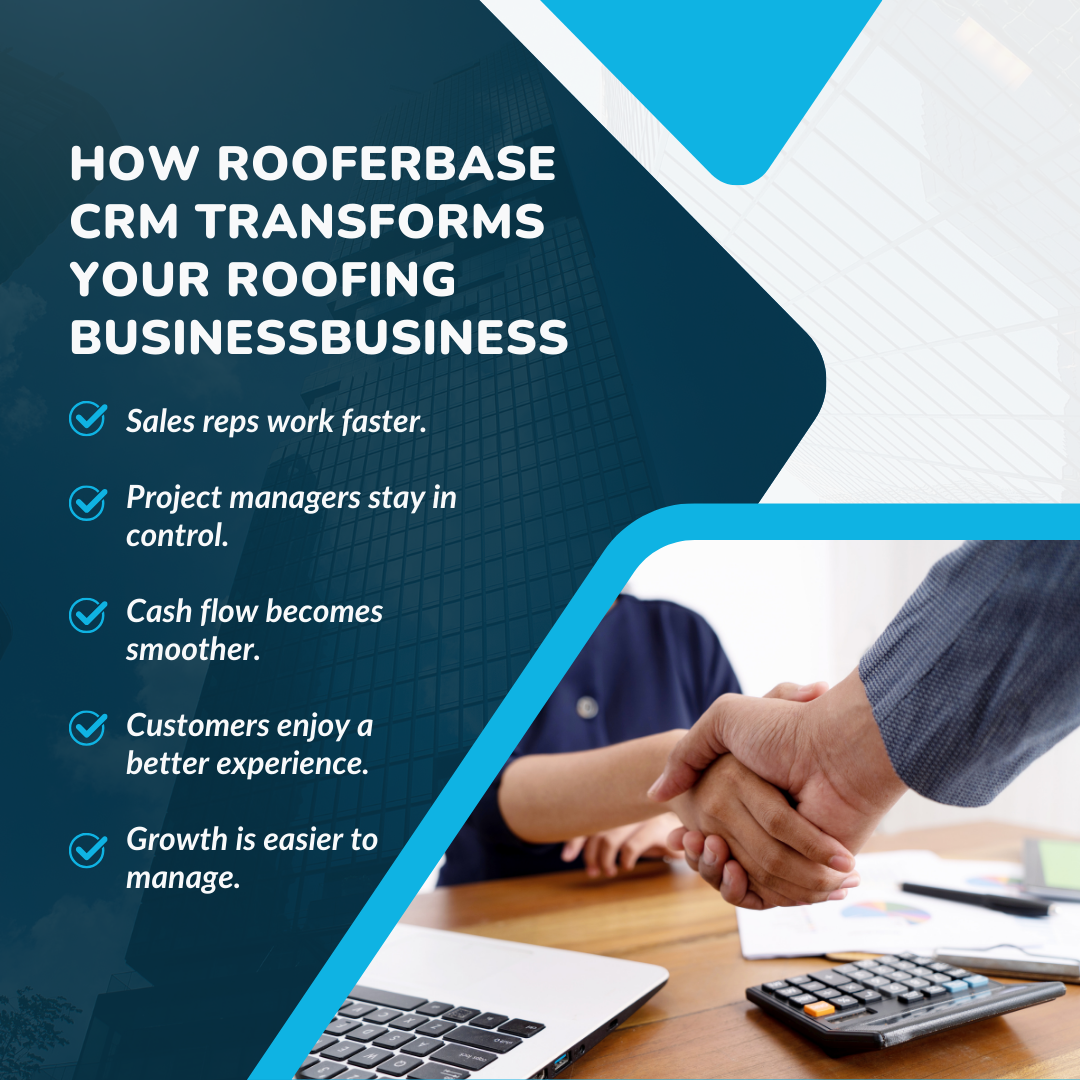
Let’s say your roofing team uses RooferBase CRM. Instead of juggling multiple tools, you’d have all the features you need in one system. From capturing leads to final billing, everything flows in a single platform.
Here’s what that looks like in action:
- Sales reps work faster. Capture leads in the field, build estimates with aerial measurements, and send proposals with e-signatures, sometimes before leaving the customer’s driveway.
- Project managers stay in control. Use drag-and-drop scheduling to quickly assign jobs, while crews upload photos directly from the job site for real-time updates.
- Cash flow becomes smoother. Automated billing, payment processing, and commission tracking streamline the financial process, eliminating the need for manual follow-ups.
- Customers enjoy a better experience. Professional estimates and clear communication tools foster trust and keep homeowners informed.
- Growth is easier to manage. Whether you’re running one crew or multiple locations, the system scales with you without adding complexity.
- Operations run more efficiently. Manage materials, crew schedules, and HR compliance from a single dashboard to avoid delays and confusion.
- Decision-making gets smarter. Built-in dashboards and reports track team performance, sales numbers, and job costs to guide your next moves.
- Opportunities come faster. Storm intelligence tools highlight affected neighborhoods so you can target new leads right after a storm hits.
For roofing contractors who want to land more jobs, work smarter, and optimize sales, a roofing CRM isn’t just software; it’s a reliable business partner.
Pick the CRM That Fits Your Business
Generic CRMs are suitable for small teams that require basic contact management, but roofing-specific CRMs are essential for driving growth.
They provide roofing companies with all the tools to manage jobs, materials, and customers efficiently, eliminating double entry and missed opportunities.
If you’re serious about building the best roofing business possible, it’s time to step up. Select a roofing CRM that enables you to capture leads, save time, and boost efficiency.
The right platform will pay for itself by helping you close more jobs and keep your roofing team focused on what they do best: building great roofs.
Ready to see how RooferBase can transform your business?
Stop juggling spreadsheets and generic tools. With RooferBase CRM, you can increase efficiency, simplify job management, and utilize integrated financing to maintain a steady cash flow.
Book a demo today and see how RooferBase can transform your business.
FAQs
How does a roofing CRM with integrated financing help my business?
A roofing CRM with integrated financing lets you offer payment options directly in your proposals. This speeds up approvals, improves cash flow, and enables you to close more deals more quickly.
Can a roofing CRM really increase efficiency for my team?
Yes. A roofing CRM helps increase efficiency by combining estimates, scheduling, photos, and communication in one platform, saving your team time and reducing mistakes.
Why choose roofing CRM software over a generic CRM if I want to increase efficiency?
Roofing CRMs are designed to enhance efficiency with features such as aerial measurements, job tracking, and integrated financing. Unlike generic CRMs, they streamline workflows specific to roofing businesses.

